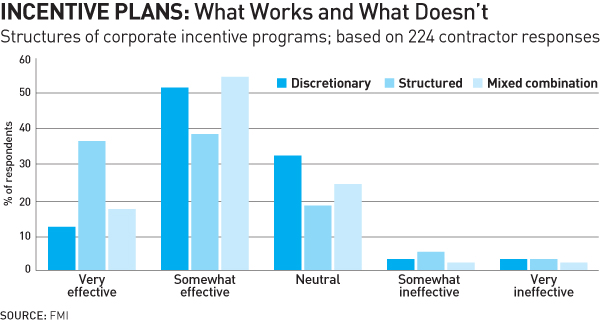
While most contractors now have employee incentive plans and offer them to half of their staffers, on average most rely on “discretionary” plans that do not note bonus goals in advance or what it takes to earn them, says a recent survey of 224 contractor executives by industry consultant FMI.
Only 21% of respondents say plans were “very effective,” says FMI.
"The biggest surprise in conducting this study was that majority of construction companies are spending significant dollars on their incentive compensation programs without ensuring that they are receiving a positive return on their investment," says study author and FMI consultant Radek Knesl. "Some contractors paid out bonuses to their employees in years when these companies lost millions of dollars."
Knesl adds that among the respondents, "those with structured plans report their incentive plans to be very effective three times more often than those with discretionary plans." The survey results reveal discretionary incentives to be least effective.
"The old 'trust me' catchphrase is not effective in motivating employees to outperform," says the survey. But FMI notes that even in firms with defined incentives, the plan may be ineffective because it is not clearly communicated to or understood by employees, or the incentive "is not significant enough to motivate the individuals."
FMI results show that 36% of respondents set incentive levels "arbitrarily," while 38% rely on feedback from peers. Only 37% say they use industry surveys, benchmarks or related sources.
Knesl emphasizes that "defining the incentive opportunity up front is key. Three out of four contractors pay discretionary incentives after the fact which is least motivating to the employees."
The survey also says incentive plans may work for employee retention but not so much to improve company productivity or attract new talent.
Nearly one-third of respondents say their biggest challenges are setting the right incentive amounts and assessing effectiveness of payouts. "Only goals that can be tracked and measured should be included in the employees' incentive plans," the survey points out.
Contractors “may be overpaying marginal performers and unable to attract higher performers,” says FMI. "Overpaying employees does not necessarily make the employees sustainably happier or more satisfied, and it can make the company less competitive."
Non-structured incentives, if tied to profits of projects bid at low "or no" margins, can be risky to firms and restricts their ability to move people among jobs, diminishing "cross-team cooperation," says FMI's survey.
Adds Knesl: "It is apparent that doing nothing or paying discretionary bonuses is least effective for moving your company forward.”
According to FMI, one best practice is to set "stretch goals" for incentive plans that are beyond a firm's best past performance "but not unattainable."





Post a comment to this article
Report Abusive Comment